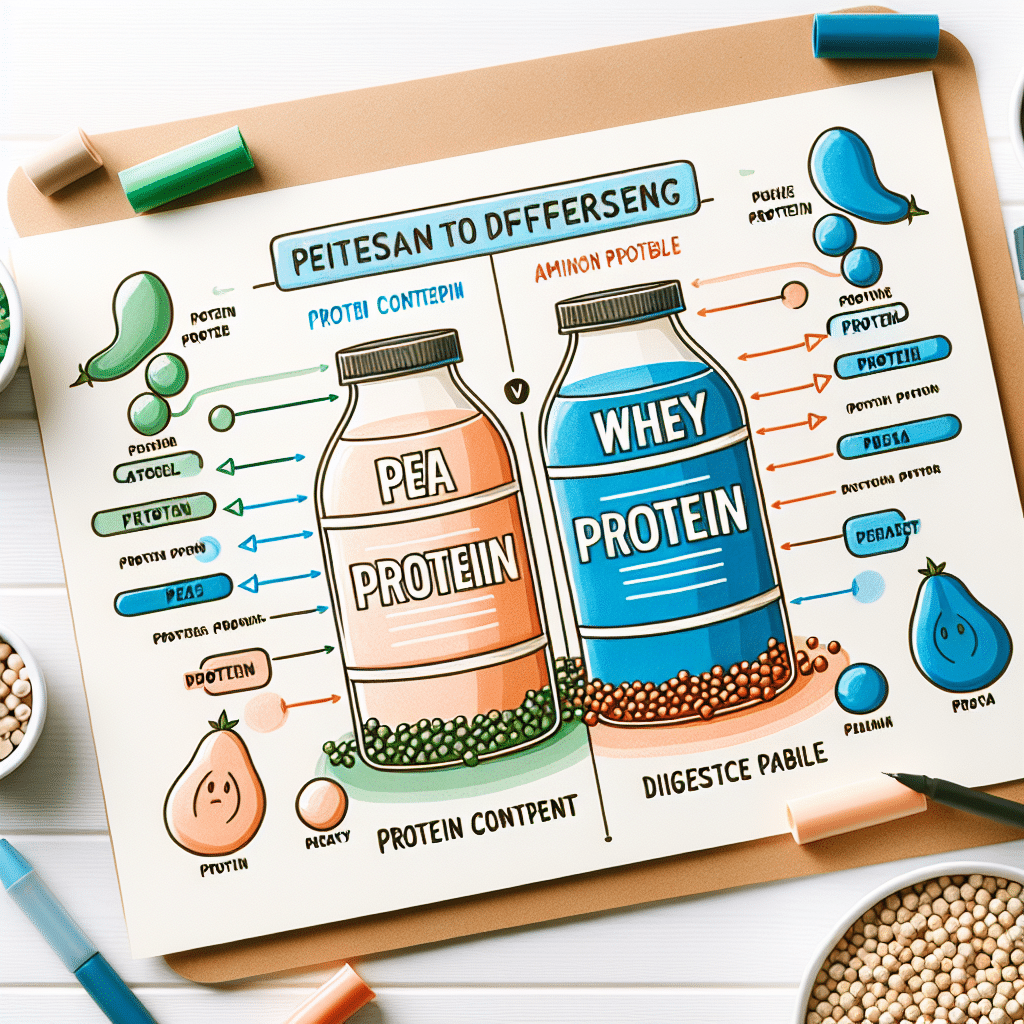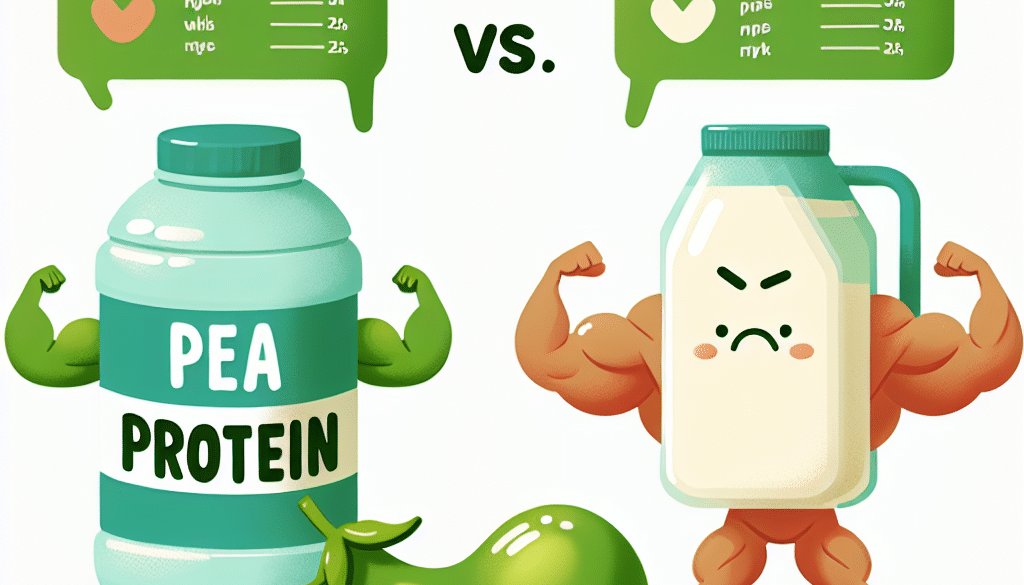Why Is Pea Protein Not As Good As Whey? Learn More
Table of Contents
- Pea Protein vs. Whey: Understanding the Differences
- Complete vs. Incomplete Protein Sources
- Digestibility and Absorption
- Impact on Muscle Growth and Recovery
- Nutritional Benefits Beyond Protein
- Lactose Content and Digestive Issues
- Environmental and Ethical Considerations
- Conclusion: Weighing the Pros and Cons
- Discover ETprotein’s Premium Protein Products
Pea Protein vs. Whey: Understanding the Differences

Protein supplements are a staple in the diets of athletes, bodybuilders, and health enthusiasts. Among the plethora of protein sources, whey and pea proteins are two popular choices. While both can contribute to muscle growth and recovery, they differ significantly in their nutritional profiles, digestibility, and overall health benefits. This article delves into why whey protein is often considered superior to pea protein.
Complete vs. Incomplete Protein Sources
One of the primary reasons whey protein is viewed as superior to pea protein is its amino acid profile. Whey protein is a complete protein, meaning it contains all nine essential amino acids that the human body cannot synthesize on its own. These amino acids are crucial for various bodily functions, including muscle repair and growth.
- Essential Amino Acids: Whey protein is particularly high in branched-chain amino acids (BCAAs) like leucine, which plays a pivotal role in muscle protein synthesis.
- Pea Protein’s Limitations: Pea protein, on the other hand, has lower levels of certain amino acids, such as methionine. While it is still a good protein source, it may need to be combined with other proteins to achieve a complete amino acid profile.
Digestibility and Absorption
Protein quality is not only about the amino acid content but also how well the body can digest and utilize it. Whey protein boasts a high digestibility score, which means it’s efficiently absorbed and used by the body.
- Biological Value: Whey protein has a biological value (BV) of 104, which is higher than pea protein’s BV. A higher BV indicates that the body can utilize more of the ingested protein.
- Speed of Absorption: Whey protein is also known for its rapid absorption rate, making it an ideal post-workout supplement for quick muscle recovery.
Impact on Muscle Growth and Recovery
For those looking to build muscle, the type of protein consumed can make a difference. Whey protein’s rich supply of BCAAs, particularly leucine, stimulates muscle protein synthesis more effectively than pea protein.
- Research Findings: Studies have shown that whey protein can lead to greater gains in muscle mass and strength compared to other protein sources when combined with resistance training.
- Pea Protein’s Role: While pea protein can still support muscle growth, it may not be as potent as whey due to its lower BCAA content.
Nutritional Benefits Beyond Protein
Whey protein is not only about its amino acid content; it also contains other beneficial nutrients.
- Immunoglobulins: Whey protein is rich in immunoglobulins, which can boost the immune system.
- Lactoferrin: It also contains lactoferrin, which has antimicrobial properties and can improve iron absorption.
Pea protein, while still nutritious, does not offer the same range of additional health benefits.
Lactose Content and Digestive Issues
Despite its benefits, whey protein is not suitable for everyone. It contains lactose, which can cause digestive issues for those who are lactose intolerant.
- Lactose Intolerance: Pea protein is naturally lactose-free and may be a better option for individuals with lactose intolerance or dairy allergies.
- Digestive Comfort: Pea protein is also less likely to cause bloating and discomfort, which some individuals experience with whey protein.
Environmental and Ethical Considerations
For those concerned with the environmental impact of their food choices, pea protein may have an advantage over whey protein.
- Sustainability: Pea protein is plant-based and generally considered more sustainable than animal-derived whey protein.
- Animal Welfare: Choosing pea protein also aligns with vegan and vegetarian ethical considerations regarding animal welfare.
Conclusion: Weighing the Pros and Cons
In conclusion, while whey protein offers a complete amino acid profile, high digestibility, and additional health benefits, it may not be the best choice for everyone. Pea protein provides a viable alternative for those with dietary restrictions or ethical concerns, despite its limitations in certain amino acids and muscle-building potential. Ultimately, the choice between pea and whey protein should be based on individual dietary needs, goals, and values.
Discover ETprotein’s Premium Protein Products
If you’re looking for high-quality protein supplements, ETprotein offers a range of products to meet your needs. Whether you prefer plant-based options like pea protein or animal-derived whey, ETprotein ensures purity, taste, and efficacy. Explore their offerings to find the perfect protein for your lifestyle and health goals.
About ETprotein:
ETprotein, a reputable protein and L-(+)-Ergothioneine (EGT) Chinese factory manufacturer and supplier, is renowned for producing, stocking, exporting, and delivering the highest quality organic bulk vegan proteins and L-(+)-Ergothioneine. They include Organic rice protein, clear rice protein, pea protein, clear pea protein, watermelon seed protein, pumpkin seed protein, sunflower seed protein, mung bean protein, peanut protein, and L-(+)-Ergothioneine EGT Pharmaceutical grade, L-(+)-Ergothioneine EGT food grade, L-(+)-Ergothioneine EGT cosmetic grade, L-(+)-Ergothioneine EGT reference grade and L-(+)-Ergothioneine EGT standard. Their offerings, characterized by a neutral taste, non-GMO, allergen-free attributes, with L-(+)-Ergothioneine purity over 98%, 99%, cater to a diverse range of industries. They serve nutraceutical, pharmaceutical, cosmeceutical, veterinary, as well as food and beverage finished product distributors, traders, and manufacturers across Europe, USA, Canada, Australia, Thailand, Japan, Korea, Brazil, and Chile, among others.
ETprotein specialization includes exporting and delivering tailor-made protein powder and finished nutritional supplements. Their extensive product range covers sectors like Food and Beverage, Sports Nutrition, Weight Management, Dietary Supplements, Health and Wellness Products, and Infant Formula, ensuring comprehensive solutions to meet all your protein needs.
As a trusted company by leading global food and beverage brands and Fortune 500 companies, ETprotein reinforces China’s reputation in the global arena. For more information or to sample their products, please contact them and email sales(at)ETprotein.com today.














